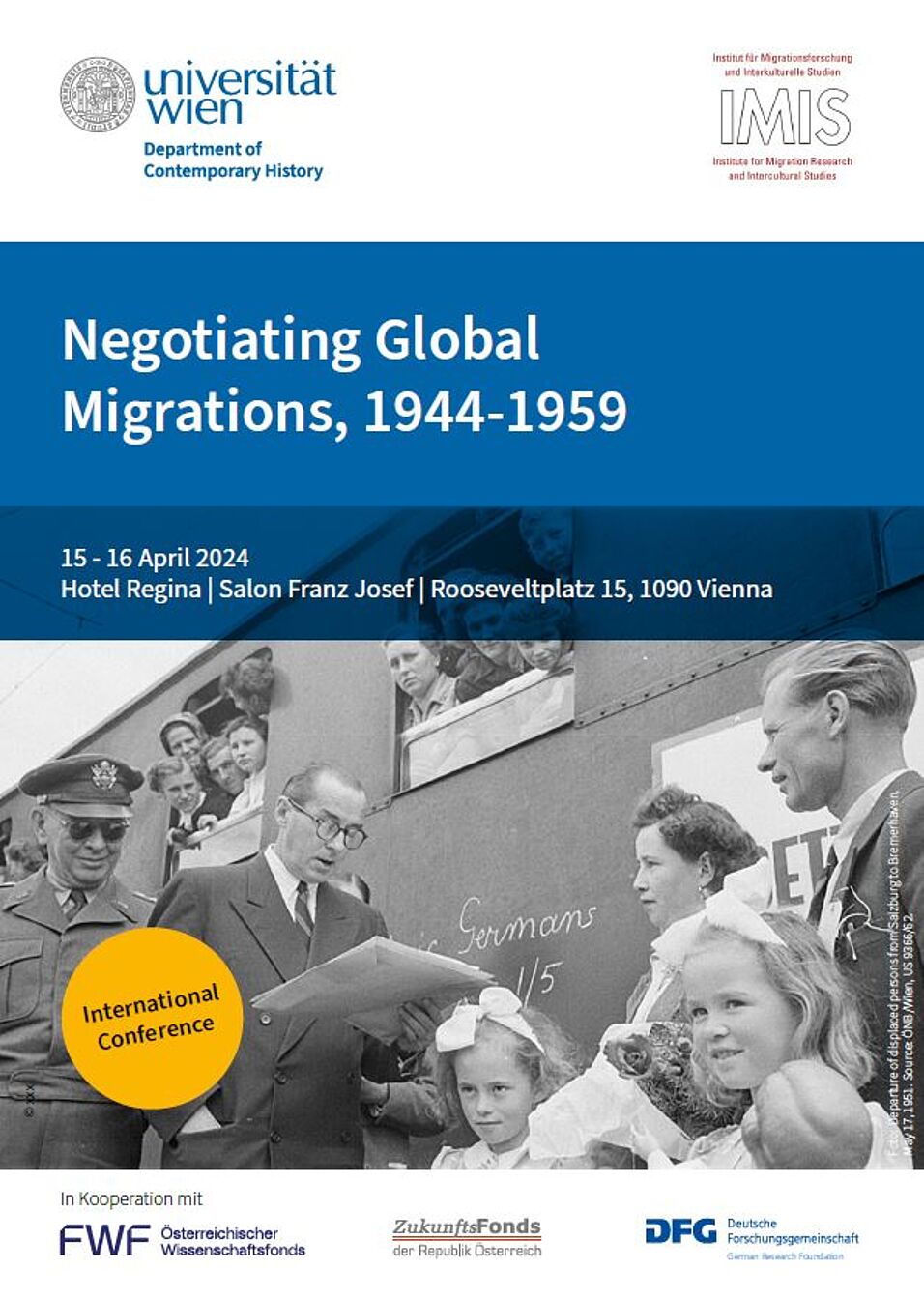Venue: University of Vienna, 15. and 16. April 2024
The conference takes place at Hotel Regina, Salon Franz Josef.
Convenors: DACH project "Norms, Regulation and Refugee Agency: Negotiating the Regime", 2022-2025; a cooperation between the University of Vienna (Prof. Dr. Kerstin von Lingen, Zeitgeschichte) and the University of Osnabrück (Prof. Dr. Christoph Rass, PD Dr. Frank Wolff, IMIS - Institut für Migrationsforschung und Interkulturelle Studien)
Joint project (DACH), entitled Norms, Regulation and Refugee Agency: Negotiating the Regime
If you would like to attend the conference as a participant, please register via mail at erika.stiller@univie.ac.at. Due to great interest, there are currently no further places available.
The 1945 breakdown of the Nazi and the Japanese Empires led to the formation of a new global order. More than 60 million people were displaced and found themselves scattered across the war-torn landscapes of Europe and Asia. Mass displacement in many regions of both continents stipulated a global movement of (trans)migration by repatriation and resettlement that obliged the international community to find solutions that allowed to react to the humanitarian catastrophe on a wider, in fact, global level. As a part of these joint international efforts, the postwar decade saw the establishment of new terminologies, procedures, and protocols, aiming at regulating mobility on a global scale, yet still based on multiple different national demands.
A new global refugee regime emerged through multi-layered negotiation processes between the institutional and administrative level (UN organizations such as UNRRA and CNRRA, IRO, nation states, religious relief organizations, various NGOs), relief organizations, and countless individuals categorized as migrants, refugees, Displaced Persons and others. Recipient countries such as Australia, Latin America, the USA and Canada, to name some preferred resettlement destinations, became important agents within the migration regimes.
In the post-war years, and especially when the IRO dealt with the so-called "hard core" of the remaining "Displaced Persons" still stranded in camps across Europe and Asia, a modern refugee regime took shape. While the modern concept of a refugee and initial steps towards international refugee policies had been developed during the interwar period as a consequence to forced displacements in Central, Southern and Eastern Europe, as well as in the Near East, the period after the Second World War presented new challenges and brought a more comprehensive approach towards the emerging, modern global migration regime. This development was not only shaped by mass mobility and displacement as issues for both local and global administration but also by the attempts to enact a human-rights based international order and the need of introducing humanitarian perspectives during the rapidly arising Cold War.
Studying normative changes, administrative practices, and human agency in the emerging refugee regime provides us with valuable insights into a highly mobile and formative period in the creation of a new world order in modern history. Most importantly, it casts light on the complex emergence of concepts, patterns of thought and organizational ideas that paved the way toward the implementation of the 1951 Geneva Refugee Convention. This path, however, was a crooked line at best, defined by emerging internationalism, national demands, Cold War humanitarianism, individual agency, and colonial trajectories. Exploring this complex constellation will provide us with new views on the emergence, the meaning and the limits of refugee protection in modern migration societies.
By focusing on negotiations of migration processes, this conference will zoom into an actor-centered global history of the emerging refugee regime by analyzing (a) the role of international organizations and experts in formulating globally impactful policies; (b) the interaction of these organizations and norms with state and local actors, such as politicians, practitioners and experts; (c) the agency of victims of violence-induced mobility during the interactive process of norm application and resettlement.

